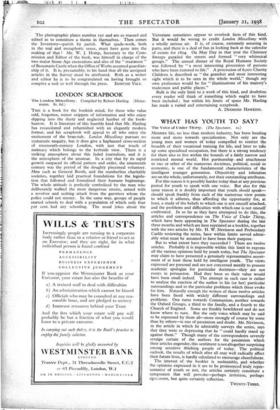LONDON SCRAPBOOK
The London Miscellany. Compiled by Robert Harling. (Heine- mann. 8s. 6d.)
THIS is a book for the bookish mind, for those who value odd, forgotten, minor snippets of information and who enjoy dipping into the dusty and neglected lumber of the book- barrow. It is literature of this humble kind that Mr. Harling has resuscitated and refurnished with an elegantly modern format, and his scrapbook will appeal to all who enjoy the excitement of the bran-tub. London Miscellany pursues no systematic enquiry, but it does give a haphazard cross-section of nineteenth-century London, with just that touch of intimacy which belongs to the kerbside view. There is a striking atmosphere about this faded journalism, and it is the atmosphere of the amateur. In a city that by its rapid growth outpaced its official pattern and order, the nineteenth century was the period of the doughty piecemeal volunteer. Men such as General Booth, and the numberless charitable societies, together laid practical foundations for the legisla- tion that followed and formalised their humane beginnings. The whole attitude is perfectly symbolised by the man who deliberately walked the most dangerous streets, armed with a revolver and seeking attack from the garotters whom the police could not master. In the- same way, groups of people started schools to deal with a population of which only four per cent. had any schooling. The usual jokes about the Victorians sometimes appear to overlook facts of this kind. But it would be wrong to credit London Miscellany with a wholly serious air. It is, of course, extremely amusing in parts, and there is a deal of fun in looking back at the calendar of events for 1804. On May Day in that year the Chimney Sweeps paraded the streets and formed " very whimsical groups." The annual dinner of the Royal Humane Society was followed by " a most interesting procession of persons who have been restored to life." A procession of 6,000 Charity Children is described as " the. grandest and most interesting sight which is to be seen in the whole world," though my own preference would be for " illuminations of his majesty's tradesmen and public places."
Bulk is the only limit to a work of this kind, and doubtless every reader will think of. Something which ought to have been included ; but within his limits of space Mr. Harling has made a varied and entertaining scrapbook.
A. DESMOND HAWKINS.














































 Previous page
Previous page